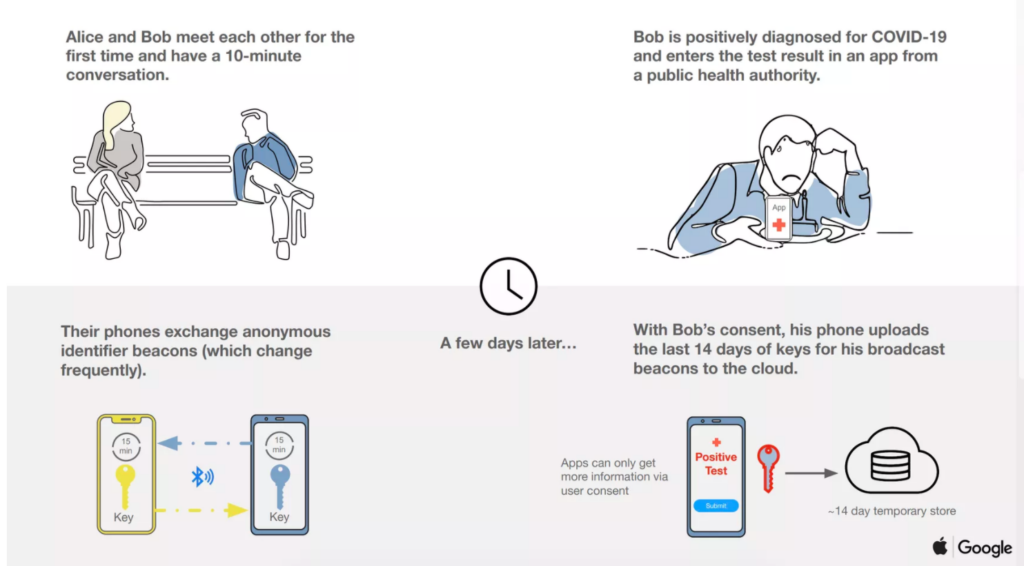
What Covid App UK and French Minitel have in common?
On a recent online meeting of London Futurists we examined UK CovidApp and it’s chances of getting us back to work faster. David Wood, Dean Bubley, Suki Fuller, Wendy Grossman and many others contributed to the discussions with their deep tech and legal knowledge.
The discussion concluded that selecting the right choice of health tech (CovidApp only one of the technologies possible here) is going to make a massive difference to opening the economy again soon, not so soon or perhaps not at all if we get tech wrong.
In the rush for solutions to end lockdown, the UK government has pushed for a release of the so called “Covid-19 Contact Tracing App”. We wish the NHS Digital team well, but in the business of apps, it is the number of downloads (bums on digital seats) that counts in terms of making them effective tool in combating the virus. For Track-and-Trace to work, the Covid-19 app would need at least 60% of us to download it.
The current tech strategy is has a number of challenges before it can deliver anything near this number.
Instead of following Google/Apple approach based on a decentralised, privacy-friendly platform that is used in a number of countries such as Germany or Switzerland, the decision was made to make our very own British app, with a spooks-friendly centralised data storage approach.

In contrast with privacy-protecting Apple/Google plan, the NHSX app is anonymous until you get sick, but once diagnosed, your data is dropped into NHS/GCHQ combo and you will have no right to ask for it to be removed, no ‘right to be forgotten’ should you wish to remove yourself from government’s data vaults. “The second you say, ‘actually I’m positive’, that has to go back up to the government server, where it starts to track you versus other people.”
Where such centralised apps were released in US, only 3% of people downloaded them, with trust also an issue in Singapore with the centralised app with only 13% uptake
What UK DYI app approach is not recognising, is this is the first time Apple and Google are working on a joint app platform strategy. This collaboration has huge resource behind it in addition to the benefit of an already installed phone user base of millions.
In this context, the British DIY app strategy is not only lacking on a privacy solution front, but suffers as well from something called the ‘Minitel illusion’. Minitel was a French terminal that offered videotext banking and telephone directory through telephone lines as an alternative to the Internet. It grew but ultimately couldn’t compete with the Internet and was subsequently retired in 2012.

Back in 1980, French techies decided that the early US-developed Internet based on TCP/IP was “inférieur” to their own network architecture. The team persuaded Giscard D’Estaing, French President at that time, who had a penchant for French-made gadgets, to back them financially. He did, putting French networking technology back by a decade.
The story of the Minitel project has many parallels to the new UK Covid-19 App. Despite huge financial backing, Minitel failed on 5 points. Those 5 challenges can and should be addressed before we risk betting on DYI British Covid-19 App.
Asking the right question to the wrong people – where to launch?
Right from the very beginning Minitel nearly died a quick death, due to wrong demographic selection of the initial pilot project. The first Minitel pilot was launched in the area of non-early adopters. It was originally piloted in a small territory, with only 55 residential (mainly retired people) and business customers in St Malo, Brittany, in July 1980.
The response was poor, the targeted users were retirees, not keen to experiment with new digital gizmos. It was only because Giscard D’Estaing did not like losing that the Minitel group persevered and tried another pilot in a bigger area, with a younger and more tech-friendly population where Minitel eventually started taking off. By then, it also included SexTel, an adult text service called Pink Pages (Minitel Rose) that punters considered a good enough reason to get this new terminal and learn how to type.
The Covid-19 App landing on Isle of Wight sounds similar, landing with an elderly community where over 40% of locals are retired and the average age is over 60. As we know from the app download data, a very small number of that age group downloads apps.
In addition, the area is so small, that if someone is diagnosed, the whole Island will be alerted by word of mouth in one afternoon.
Tip: If you want to pilot an app, any app, do it in high app-downloading areas like Shoreditch, where app download is a second nature to the locals. High digital and software industry concentrated places like Bristol, Brighton or Bath are the best for pilots. If it doesn’t work in one of the so called “3Bs”, it will not work anywhere else.
If early adopters see it as a good thing, they will then install it on their parents and grand-parents’ phones, as we did for early email, Facebook and more recently Zoom. App adoption goes from the young/tech-friendly to old, not the other way around, no matter if it’s Simms, Twitter or the Covid19App.
Technical Cul De Sac tech or betting against Google/Apple
French engineers have a penchant to consider themselves the smartest nerds in the room (we were involved with French at Easynet, the first ISP in France for over 10 years so witnessed it first-hand). They decided that nascent Internet technology was not the ‘gallic way’, too American and so chosen to launch an alternative.
It was a strange time, unlike today, with both UK and France looking away from US and trying to develop their own tech. Peter Kirstein, Father of European Internet, noted recently that even the UK nearly did not join ‘American’ Internet as the then UK Prime Minister was leaning to the French model due to political reasons (ironically due to EU sympathies, no less).
Peter pretty much single-handedly saved the day and brought Internet to the UK, rather than letting the UK gov wasting money on cul-de-sacs of ‘national’ networking technologies or our own Minitel fiasco. In digital tech, global scale was everything then and it still is now. France alas did not have their own Peter Kirstein and got lured into spending a huge amount of money on Minitel.
Minitel was a brilliant invention, but it was coming against the fast growing global Internet. It simply couldn’t compete with their high cost of terminals that were not useful for anything else, unlike the Internet that works on multi-tasking Personal Computers. It has left French technology community so far behind, it took them a decade to catch up and re-join the digital cross-border ecosystem.
The lesson is that the game is not about who is the brightest in the room (the French engineers often are) but about making smart, strategic tech choices, avoiding myopic thinking which gets quickly penalised in the face of the global tech ecosystem.
Today, even small events on apps, like making the app use location nicely, are deeply dependent on Apple. iPhone is trying a more privacy-friendly approach and often introduces extra hoops for apps developers who would like to use location (see recent changes launched in iOS 13 that will have impact for location apps https://www.howtogeek.com/563557/why-your-iphone-keeps-asking-you-about-background-location-use/ ).
You don’t really want to be developing a new, mission critical health app making assumptions that Apple will leave the current Location access alone just to make your UK DYI app work. The UK is but a tiny piece of the world game that Apple plays. We can only ride their hardware if we stick to their tech strategy https://reincubate.com/blog/staying-alive-covid-19-background-tracing/
The background tracing appears to work (in NHS app), although it remains very much in Apple’s control as to whether this will continue to be effective. As a consequence, the effectiveness of the British response to COVID-19 is now also in Apple’s control.
Apps live in a high dependencies environment, in a world of giant digital Jenga, where a small glitch on Facebook SDK on 6th of May upset dating people world-wide as it brought down hundreds of apps dependent on Facebook sign-in such as, on the dating Tinder.
We are lucky that there are iPhones and Android phones around that we can use to ‘carry’ the Covid-19 App. But it is not our hardware or our operating system. The UK Covid-19 App is a guest on hardware and software platforms that belong to others and being a guest requires humility and “knowing your place” in the tech ecosystem. Unless the NHS starts making their own phones, the best bet would be to stick tight with the strategy of the phone suppliers/operating system owners or we may end up Minitel-like in a tech cul-de-sac.
International incompatibility
The key problem with Minitel was that the terminal did not work abroad. The set up was incompatible with what the rest of the world was following. To compete, the French Minitel needed scale, which meant international growth. But the attempts to set it up in Ireland and Poland (my first business start up so I may be bitter) failed.
Selecting British Covid19app with local flavour instead of set up over the international Google/Apple platform looks like a high risk choice. It was dictated by the interest in gathering all data centrally, unlike Apple/Google where approach that is decentralised and no state gets a look at diagnosed citizen’s data.
London’s success with pandemic will live or die by international solution. London is the capital of the world, nearly 100 million people fly in every year. We already struggle with controlling the virus from the usual inbound London traffic from abroad. According to Sky News, 18 million people flew into UK since Jan 2020, while only 300 of them were quarantined. https://news.sky.com/story/coronavirus-fewer-than-300-people-entering-uk-were-quarantined-in-three-months-before-lockdown-11983608

If international travellers will have to download a special UK Covid-19 app instead of using what they already have from their own country, it will make app onboarding friction harder to overcome. As fewer people will download it, less data will be gathered. This is clearly the opposite of what the epidemiologist leading the project, Prof Christopher Fraser wanted to achieve
Would Facebook would be successful as an app if it asked people to download a new app version in each country?
“The State? I am the State “ – is Matt Hancock a new Louis XIV?
The main problem with Minitel technically was it’s tech centralisation. The updates of hardware and software had to be run by one company. It was a huge, eventually unsurmountable, task for one national organisation to fight the world’s combined tech brains on decentralised Internet.
Upgrades, updates, innovation, it all takes a big effort if it has to be run from one central ‘brain’. DYI Minitel eventually lost pace behind decentralised Internet where thousands of groups were developing new hardware and software and improving their project on daily basis. Sharing is caring and where speed matters, strength is found in numbers, not in solitude.
NHSX will have to fight a long, lonely battle, restricted to one team, instead of sharing the specs/knowledge and maintaining pace of improvements on the solution that is taken up by Germany, Switzerland, Estonia and others. Inevitably, just like the French with their Minitel, UK may end up having to switch the horse half-race to get the number of downloads we need to speed up re-opening of the economy.
Show me the money
Minitel costs were truly enormous, as it required the French Post Office to practically give away free terminals to every business and household in the country to onboard the locals. As the advent of PCs became notable in France, incompatibility of Minitel meant that it was not possible to leverage home-PCs to use the service. In other countries that went with Internet standard, the speed of rollout was much faster as the hardware was already in the homes. It meant that inherently, the Internet was going to be the cheaper option and could grow faster.
Covid-App, build by NHS may end up costing a fortune when the option of building on Google/Apple platform would be not only more privacy -protective, quicker, cheaper, but also future-proof and usable internationally.
Retail, real estate and warehouses will find their own solutions, based on mandatory use of wristbands or beacons.
But for general public CovidApp, what may help NHSx is a pivot to Apple/Google platform and a new pilot in Brighton, Bristol or Bath, to get the folk there to test then install on parents/grandparents phones. If it reaches 60% in those communities, we are on to a winner and closer to pubs re-opening for the summer.

Thanks to London Futurists for a great debate on a such a complex but important topic.




